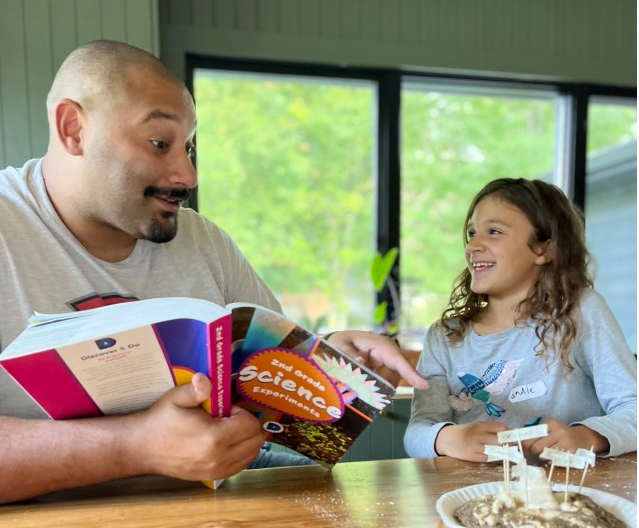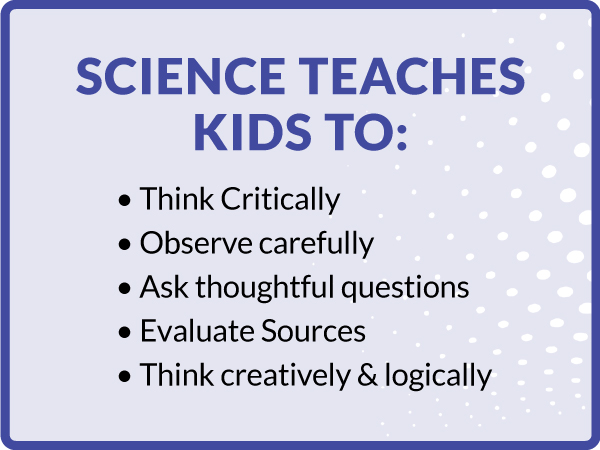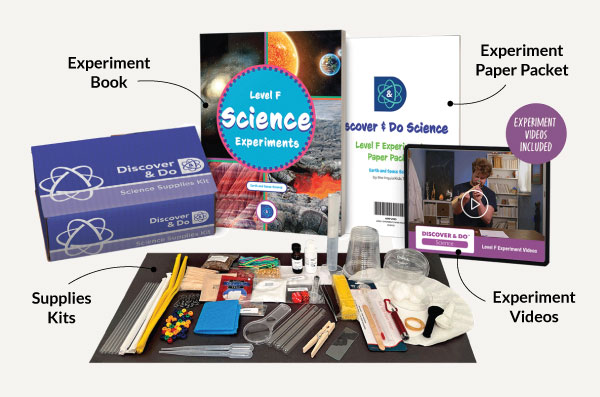Lab skills = life skills. Discover the various ways science can enrich your child’s life and prepare them for their future.

Science is so much more than memorizing the periodic table or labeling animal groups. It’s about growing curious kids who ask big questions, solve real problems, and see God’s incredible design in the world around them.
When your children roll up their sleeves for hands-on experiments, they’re not just “doing science.” They’re building life skills they’ll carry forever—skills like planning, problem-solving, and thinking critically about the world.
So what life skills can science really teach your kids? Let’s take a closer look.
Building Basic Life Skills Through Safety
We all want our kids to be safe, and when it comes to science for kids, one of the most fundamental life skills taught is safety awareness. In addition to learning about lab safety, children also learn to assess risks, follow safety protocols, and make responsible decisions based on their environment.
Just think about all the ways science invites kids to consider their safety: Your child dons their goggles, reads instructions, and realizes science isn’t just fun—it’s about responsibility too.
These acts can invite you to discuss other ways your kids can be safe, like looking both ways before crossing the street, wearing oven mitts when cooking, or safety concerns in sports activities. Beyond personal safety, science education also teaches children about environmental and community safety. Understanding concepts like pollution, chemical reactions, and ecosystem balance helps kids understand their impact on the world around them.
Science Lessons for Kids: Learning to Plan and Adapt Like Real Scientists
Scientific inquiry and activities require careful planning and flexibility. Even when experiments are pre-planned and come with all the provided materials (like our Science Curriculum Packages and Discover & Do Science Packages), kids still have to consider variables and think ahead, which requires organizational skills.
Because science often involves failure, children also learn flexibility. Experiments don't always go as planned. But that's a good thing! When kids adapt and try again, they develop resilience, flexibility, and perseverance, skills they'll use for the rest of their lives.
The nature of scientific investigation—planning, testing, analyzing, and revising—mirrors many real-world processes. Whether a child is later planning a school project, organizing a community event, or developing a business strategy, the skills learned through scientific planning and adaptation will prove invaluable.
Science Skills: Curiosity & Questioning
Science for kids naturally nurtures curiosity by encouraging children to ask "why" and "how" about the world around them. This questioning mindset is one of the most valuable life skills a child can develop. Children who learn to ask thoughtful questions become better learners, more engaging conversationalists, and more innovative problem-solvers.
Through science education, children learn that questioning is not just acceptable; it's essential. They discover that even established scientific knowledge began with someone asking questions and seeking answers. This understanding empowers children to:
- challenge assumptions,
- seek deeper understanding, and
- approach problems with an open mind.
The habit of questioning also develops listening skills and empathy. When children learn to ask good questions, they become more interested in others' perspectives and experiences.
Confidence: What Is Gained from Science for Kids?
Science education builds confidence in multiple ways, particularly in decision-making abilities. When children form hypotheses, they learn to make educated guesses based on available information. When they design experiments, they make choices about materials, methods, and measurements. These experiences teach children that they can trust their reasoning abilities and make good decisions even when they don't have all the answers.
The decision-making confidence that science builds is particularly valuable because it's based on evidence and reasoning rather than guesswork. Children learn to gather information, consider options, and make choices based on logical thinking. They also learn that it's okay to change their minds when new evidence emerges, which prevents them from becoming stuck in poor decisions.
Science Skills for Life: Teaching Critical Thinking & Analysis
Children learn to observe carefully, collect data systematically, and analyze information objectively. They develop the ability to distinguish between correlation and causation, identify bias in information sources, and evaluate the strength of evidence.
Science education teaches children to approach information with healthy skepticism while remaining open to new ideas. They learn to ask important questions like:
- What evidence supports this claim?
- What alternative explanations might exist?
- How reliable is this source?
The analytical thinking that science develops also enhances creativity. When children understand how things work and why certain patterns exist, they can better envision new possibilities and innovative solutions.
Science Skills: Communication & Collaboration
Science education inherently develops communication skills as children learn to explain their observations, share their findings, and collaborate on investigations. Whether they're describing the results of an experiment or working together to solve a problem, children develop the ability to express complex ideas clearly and work effectively with others.
These communication skills extend far beyond scientific contexts. Children who can explain their thinking clearly, listen to others' ideas, and collaborate effectively are better prepared for academic success, workplace collaboration, and personal relationships.
Science for Kids Leads to Career & Life Readiness
The life skills that science education develops create a strong foundation for career success across all fields. While not every child will become a scientist, the thinking skills, problem-solving abilities, and work habits that science teaches are valuable in every profession. Engineers, teachers, business leaders, artists, and healthcare workers all benefit from the analytical thinking, communication skills, and innovative mindset that science education fosters.
From learning to question the world around them to developing confidence in problem-solving, science education provides a foundation for success in all areas of life. Science teaches kids valuable skills, including safety awareness, planning and flexibility, curiosity, confidence in decision-making, and critical thinking abilities that prepare them for future careers and personal growth.
What Are Ways Children Can Learn Science?
You might be thinking you want your children to learn these life skills...but how do you actually teach science?
That's where Sonlight makes it simple. Our literature-based Science Curriculum (K-12) and Discover & Do Science Packages (K-8) include:
- Everything you need for hands-on learning
- Step-by-step guides and videos (K-8)
- Award-winning Instructor's Guides that take the guesswork out of teaching
With Sonlight, science becomes a fun, low-stress experience that builds family connection and student confidence—without overwhelming you.






